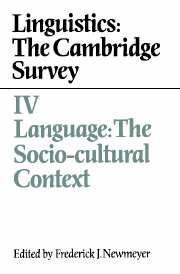Book contents
- Frontmatter
- Contents
- Contributors
- Preface
- 1 The study of language in its socio-cultural context
- 2 Language, culture, and world-view
- 3 Language and social class
- 4 Language and race: some implications for linguistic science
- 5 Language and gender
- 6 Bilingualism
- 7 Dialectology
- 8 Sociolinguistics and syntactic variation
- 9 Language birth: the processes of pidginization and creolization
- 10 Language death
- 11 Language planning: the view from linguistics
- 12 Ethnography of speaking: toward a linguistics of the praxis
- 13 The organization of discourse
- 14 Conversation analysis
- Index of names
- Index of subjects
- Contents of Volumes I, II, and III
7 - Dialectology
Published online by Cambridge University Press: 05 June 2012
- Frontmatter
- Contents
- Contributors
- Preface
- 1 The study of language in its socio-cultural context
- 2 Language, culture, and world-view
- 3 Language and social class
- 4 Language and race: some implications for linguistic science
- 5 Language and gender
- 6 Bilingualism
- 7 Dialectology
- 8 Sociolinguistics and syntactic variation
- 9 Language birth: the processes of pidginization and creolization
- 10 Language death
- 11 Language planning: the view from linguistics
- 12 Ethnography of speaking: toward a linguistics of the praxis
- 13 The organization of discourse
- 14 Conversation analysis
- Index of names
- Index of subjects
- Contents of Volumes I, II, and III
Summary
Introduction
Dialectology is ‘the study of dialect and dialects’ (Chambers & Trudgill 1980: 3). Not surprisingly, the major issues in the field of dialectology during the century of its existence have been deciding which varieties of language count as dialect and how best to study them. Seen in this light, the history of the discipline can, without too much exaggeration, be characterized as the shift from collecting facts about geographically distributed, (mostly) rural varieties of language to analyzing the distribution of features of (mostly) urban varieties as these features correlate with social and linguistic factors.
This shift in methodology has been accompanied by important changes in the goals of the discipline. Whereas the dialectologists of the late nineteenth century collected data in order to test the contentions of the Neogrammarians about the exceptionless nature of sound change, later researchers, especially those engaged in linguistic atlas projects, collected and studied data mainly as a contribution to the description and history of a particular language. More recently, however, practitioners of urban dialectology, often referred to as sociolinguists or quantitative sociolinguists, have conceived of their work as one of the several ‘way(s) of doing linguistics.’ As Trudgill puts it, such research
is concerned to learn more about language, and to investigate topics such as the mechanisms of linguistic change; the nature of linguistic variability; and the structure of linguistic systems.[…]
- Type
- Chapter
- Information
- Linguistics: The Cambridge Survey , pp. 119 - 139Publisher: Cambridge University PressPrint publication year: 1988

